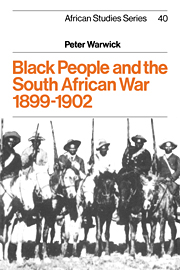Book contents
Summary
The South African war was one of the most costly and bitterly contested military encounters between whites on African soil. The issues over which it was fought, the way in which events unfolded between 1899 and 1902, and the nature of the state that was created in its aftermath, these affected all the people of the subcontinent – mining magnate, commercial farmer, poor white tenant, black schoolteacher, clerk, peasant and worker alike. By looking afresh at the war as a social as well as a military and political phenomenon, and in particular by examining the ways in which it affected the lives and livelihoods of black people, the preceding chapters have sought to shed new light on some of the more familiar episodes and historical concerns of the period, and to pave the way for a more complete understanding of the war's social history.
In 1899 neither side chose to take for granted the subordination of all the black communities within and along its borders. The colonial incorporation of the major African states of the region was a relatively recent occurrence, and while the processes of social change engendered by the mineral revolution were clearly in evidence, the structures of a society transformed by mining capital were less rigid and secure than they were to become in the twentieth century. In Natal less than one in five white males of military age were called up for active service.
- Type
- Chapter
- Information
- Black People and the South African War 1899–1902 , pp. 179 - 184Publisher: Cambridge University PressPrint publication year: 1983



